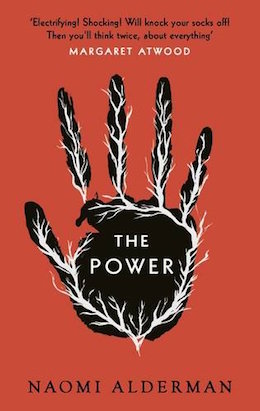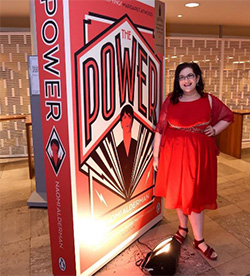When, two hundred thousand words into what was to be her next novel, English author Naomi Alderman decided to ditch her current work in progress to focus, instead, on a feminist science fiction story about a world in which women can electrocute men just by laying their hands on them, she couldn’t have had a clue just what that book would do.
But that book just became the first work of speculative fiction to win the Baileys Women’s Prize for Fiction.
Published in the UK late last year by Penguin, The Power is—in the words of this year’s Chair of Judges, Tessa Ross—a “brilliantly imagined dystopia” whose “big ideas” the four judges under her jurisdiction just kept coming back to, despite a hotly-contested shortlist.
The Power follows four main characters as they pick their way through the changed landscape of Alderman’s imagination:
There’s Roxy, the daughter of a London crime family with three older brothers; she was never supposed to take over the family business but she starts to have other ideas. There’s Tunde, a young journalism student in Lagos, who sees that the revolution needs documenting, and gets himself into some dicey situations trying to be the one to do it. There’s Allie, who comes from a troubled background in the South of the USA and sees that what people need is something new to believe in. And there’s Margot, who was a low-level politician in New England but begins to have new ambitions.
Our own Mahvesh Murad was left “amazed and horrified in the best of ways” by Alderman’s award-winning novel, as she explained in Tor.com’s most recent Reviewers’ Choice:
I’ve been calling it the wild godchild of Atwood’s The Handmaid’s Tale and Rukaiya Hossain’s The Sultana’s Dream, and it is this and much more. In a world where women have the physical ability to electrocute anyone or anything at will, what happens to power balances between genders? What happens to the gender biases in current societal conflict, in politics, in family life? Why do we assume that if women have brute strength, they won’t use it to gain absolute power, and that absolute power won’t corrupt them? It’s a shocking book, not because if the actions of the women, but because it forces you to analyse your own gender based assumptions about women—even if you yourself are one.
 At a star-studded ceremony in the Royal Festival Hall in London last night, the former games columnist was awarded £30,000 and a Bessie—which is to say one of the traditional bronze figurine given to every Women’s Prize for Fiction winner. On stage, Alderman said that “the women’s movement is more vital to me than any other utility that might come into my house. […] More vital to me than electricity,” even.
At a star-studded ceremony in the Royal Festival Hall in London last night, the former games columnist was awarded £30,000 and a Bessie—which is to say one of the traditional bronze figurine given to every Women’s Prize for Fiction winner. On stage, Alderman said that “the women’s movement is more vital to me than any other utility that might come into my house. […] More vital to me than electricity,” even.
A little electricity will however be necessary if you ever want to watch the TV adaptation of The Power Sister Pictures, the co-producer of hit Brit series Broadchurch, is currently at work on. And that nugget of good news just got even gooder, because it’s to be written by Alderman herself, and promises to “expand” on the stories told in her now venerated text in much the same way Hulu’s version of The Handmaid’s Tale has.
But I dare say Alderman’s adaptation might yet be a while away. Meantime, you could, you know, read the book. I hear it’s quite good!
Niall Alexander is an extra-curricular English teacher who reads and writes about all things weird and wonderful for The Speculative Scotsman, Strange Horizons, and Tor.com. He lives with about a bazillion books, his better half and a certain sleekit wee beastie in the central belt of bonnie Scotland.










